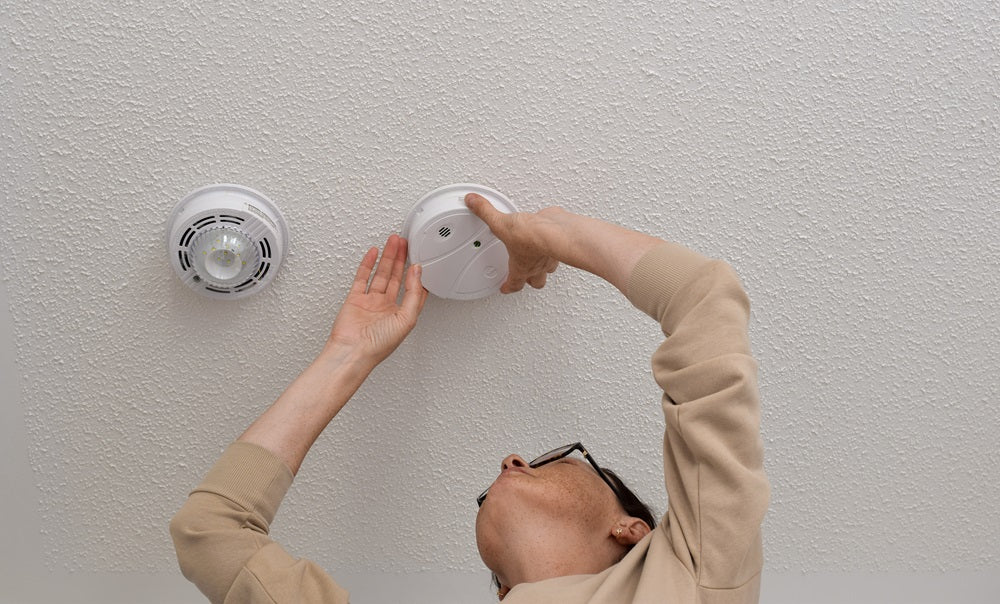
What Are the Rules for Smoke Detectors in the UK?
Smoke detectors play a vital role in protecting lives and property from the devastating effects of fire. In the UK, smoke alarm regulations vary across England, Scotland, Wales, and Northern Ireland, with each region governed by its own set of building and safety regulations. This guide offers a comprehensive breakdown of the latest rules, helping homeowners, landlords, and developers ensure full compliance.
Building Regulations in England, Scotland, and Wales
England and Wales – Building Regulations Document B (Volume 1)
In England and Wales, smoke alarm requirements are detailed in Building Regulations Document B (Volume 1) – specifically in the sections related to fire safety in dwellings.
Key requirements include:
-
New dwellings must have a minimum of one smoke alarm on every storey that contains a habitable room.
-
Smoke alarms must be mains-powered and have a battery backup.
-
Alarms should be interlinked, so if one is triggered, all alarms sound.
-
In homes with a heat-producing appliance (e.g. a boiler), a carbon monoxide alarm is also required in the same room.
-
For existing homes, there is currently no legal requirement to upgrade to mains-powered alarms unless renovation or extension work is being carried out that triggers Building Regulation compliance.
Note: While mains-powered alarms are required in new builds, for additional peace of mind and easier maintenance, many homeowners opt for alarms with a sealed 10-year battery backup, which reduces the need for regular battery replacements and ensures long-term reliability.
Scotland – Technical Handbook (Domestic) – Fire
Scotland has the most stringent requirements in the UK, outlined in the Technical Handbook (Domestic) – Fire, and bolstered by the Housing (Scotland) Act 1987 (as amended).
Since February 2022, all homes in Scotland, regardless of ownership or tenancy, must comply with the following:
-
At least one smoke alarm installed in the living room or the room most used during the day.
-
One smoke alarm in every hallway and landing.
-
One heat alarm in every kitchen.
-
All alarms must be interlinked, either via hardwiring or radio frequency.
-
A carbon monoxide alarm must be fitted in any room containing a fuel-burning appliance or a flue.
All alarms must be ceiling-mounted and comply with British Standards:
-
Smoke alarms: BS EN 14604
-
Heat alarms: BS 5446-2
-
CO alarms: British Kitemark or CE marked and meet EN 50291-1
In line with these standards, Scotland also encourages the use of 10-year sealed battery units for both smoke and heat alarms to minimise maintenance and ensure long-term performance.
Northern Ireland – Technical Booklet E
In Northern Ireland, smoke detector regulations are governed by Technical Booklet E – Fire Safety (under the Building Regulations (Northern Ireland) 2012).
The rules for new dwellings include:
-
At least one smoke alarm on every storey containing a habitable room.
-
Smoke alarms must be mains-powered with battery backup and should be interlinked.
-
A heat detector is required in kitchens.
-
Smoke alarms should be located in circulation spaces such as hallways and landings.
Unlike Scotland, Northern Ireland does not currently require interlinked alarms in all existing homes, although landlords and housing associations often follow best practices beyond the legal minimum.
| Region | Smoke Alarms on Every Storey | Mains Powered | Interlinked | Carbon Monoxide Alarm Required |
|---|---|---|---|---|
| England & Wales | Yes (new builds) | Yes | Yes | Yes (if fuel-burning appliance) |
| Scotland | Yes (all homes) | Yes | Yes | Yes |
| Northern Ireland | Yes (new builds) | Yes | Yes | Yes (if fuel-burning appliance) |
Final Thoughts
Smoke detector regulations in the UK have evolved to reflect the importance of fire safety. While Scotland currently leads with the most robust requirements, it's essential for property owners across all UK regions to stay informed and compliant. Whether you’re developing new housing, upgrading a property, or ensuring rental compliance, installing high-quality, correctly positioned smoke and CO detectors should be a top priority.
For added convenience and safety, consider choosing alarms with a 10-year sealed battery, which provide long-lasting protection without the need for frequent battery changes.
Need help selecting or installing compliant smoke alarms? West Base Direct offers a wide range of certified products and expert advice to help keep your property safe and up to code.
Energizer A-Rated Bulbs

Energizer S29628 A Rated LED Elite GLS E27 Filament 806lm 3.8W 2700K (Warm White)
Energizer S29628 A Rated LED Elite GLS E27 Filament 806lm 3.8W 2700K (Warm White) Energizer products are recognised as one of the most trusted and ...
View full details
Energizer S29628 A Rated LED Elite GLS E27 Filament 806lm 3.8W 2700K (Warm White)(12 Pack)
Energizer S29628 A Rated LED Elite GLS E27 Filament 806lm 3.8W 2700K (Warm White)(12 Pack) Energizer products are recognised as one of the most tru...
View full details
Energizer S29629 A Rated LED Elite GLS E27 Filament 806lm 3.8W 6500K (Daylight)
Energizer S29629 A Rated LED Elite GLS E27 Filament 806lm 3.8W 6500K (Daylight) Energizer products are recognised as one of the most trusted and hi...
View full details
Energizer S29629 A Rated LED Elite GLS E27 Filament 806lm 3.8W 6500K (Daylight)(12 Pack)
Energizer S29629 A Rated LED Elite GLS E27 Filament 806lm 3.8W 6500K (Daylight)(12 Pack) Energizer products are recognised as one of the most trust...
View full details
Energizer S29630 A Rated LED Elite GLS B22 Filament 806lm 3.8W 2700K (Warm White)
Energizer S29630 A Rated LED Elite GLS B22 Filament 806lm 3.8W 2700K (Warm White) Energizer products are recognised as one of the most trusted and ...
View full details
Energizer S29630 A Rated LED Elite GLS B22 Filament 806lm 3.8W 2700K (Warm White)(12 Pack)
Energizer S29630 A Rated LED Elite GLS B22 Filament 806lm 3.8W 2700K (Warm White)(12 Pack) Energizer products are recognised as one of the most tru...
View full details
Energizer S29631 A Rated LED Elite GLS B22 Filament 806lm 3.8W 6500K (Daylight)
Energizer S29631 A Rated LED Elite GLS B22 Filament 806lm 3.8W 6500K (Daylight) Energizer products are recognised as one of the most trusted and hi...
View full details
Energizer S29631 A Rated LED Elite GLS B22 Filament 806lm 3.8W 6500K (Daylight)(12 Pack)
Energizer S29631 A Rated LED Elite GLS B22 Filament 806lm 3.8W 6500K (Daylight)(12 Pack) Energizer products are recognised as one of the most trust...
View full details
Energizer S29632 A Rated LED Elite GLS E27 Filament 1521lm 7.2W 2700K (Warm White)
Energizer S29632 A Rated LED Elite GLS E27 Filament 1521lm 7.2W 2700K (Warm White) Energizer products are recognised as one of the most trusted and...
View full details
Energizer S29632 A Rated LED Elite GLS E27 Filament 1521lm 7.2W 2700K (Warm White)(12 Pack)
Energizer S29632 A Rated LED Elite GLS E27 Filament 1521lm 7.2W 2700K (Warm White)(12 Pack) Energizer products are recognised as one of the most tr...
View full details
Energizer S29633 A Rated LED Elite GLS E27 Filament 1521lm 7.2W 6500K (Daylight)
Energizer S29633 A Rated LED Elite GLS E27 Filament 1521lm 7.2W 6500K (Daylight) Energizer products are recognised as one of the most trusted and h...
View full details
Energizer S29633 A Rated LED Elite GLS E27 Filament 1521lm 7.2W 6500K (Daylight)(12 Pack)
Energizer S29633 A Rated LED Elite GLS E27 Filament 1521lm 7.2W 6500K (Daylight)(12 Pack) Energizer products are recognised as one of the most trus...
View full details
Energizer S29634 A Rated LED Elite GLS B22 Filament 1521lm 7.2W 2700K (Warm White)
Energizer S29634 A Rated LED Elite GLS B22 Filament 1521lm 7.2W 2700K (Warm White) Energizer products are recognised as one of the most trusted and...
View full details
Energizer S29634 A Rated LED Elite GLS B22 Filament 1521lm 7.2W 2700K (Warm White)(12 Pack)
Energizer S29634 A Rated LED Elite GLS B22 Filament 1521lm 7.2W 2700K (Warm White)(12 Pack) Energizer products are recognised as one of the most tr...
View full details
Energizer S29635 A Rated LED Elite GLS B22 Filament 1521lm 7.2W 6500K (Warm White)
Energizer S29635 A Rated LED Elite GLS B22 Filament 1521lm 7.2W 6500K (Warm White) Energizer products are recognised as one of the most trusted and...
View full details
Energizer S29635 A Rated LED Elite GLS B22 Filament 1521lm 7.2W 6500K (Warm White)(12 Pack)
Energizer S29635 A Rated LED Elite GLS B22 Filament 1521lm 7.2W 6500K (Warm White)(12 Pack) Energizer products are recognised as one of the most tr...
View full details
Energizer S29636 A Rated LED Elite Candle E27 Filament 470lm 2.2W 2700K (Warm White)
Energizer S29636 A Rated LED Elite Candle E27 Filament 470lm 2.2W 2700K (Warm White) Energizer products are recognised as one of the most trusted a...
View full details
Energizer S29636 A Rated LED Elite Candle E27 Filament 470lm 2.2W 2700K (Warm White)(12 Pack)
Energizer S29636 A Rated LED Elite Candle E27 Filament 470lm 2.2W 2700K (Warm White)(12 Pack) Energizer products are recognised as one of the most ...
View full details
Energizer S29637 A Rated LED Elite Candle E27 Filament 470lm 2.2W 6500K (Daylight)
Energizer S29637 A Rated LED Elite Candle E27 Filament 470lm 2.2W 6500K (Daylight) Energizer products are recognised as one of the most trusted and...
View full details
Energizer S29637 A Rated LED Elite Candle E27 Filament 470lm 2.2W 6500K (Daylight)(12 Pack)
Energizer S29637 A Rated LED Elite Candle E27 Filament 470lm 2.2W 6500K (Daylight)(12 Pack) Energizer products are recognised as one of the most tr...
View full details
Energizer S29638 A Rated LED Elite Candle B22 Filament 470lm 2.2W 2700K (Warm White)
Energizer S29638 A Rated LED Elite Candle B22 Filament 470lm 2.2W 2700K (Warm White) Energizer products are recognised as one of the most trusted a...
View full details
Energizer S29638 A Rated LED Elite Candle B22 Filament 470lm 2.2W 2700K (Warm White)(12 Pack)
Energizer S29638 A Rated LED Elite Candle B22 Filament 470lm 2.2W 2700K (Warm White)(12 Pack) Energizer products are recognised as one of the most ...
View full details
Energizer S29639 A Rated LED Elite Candle B22 Filament 470lm 2.2W 6500K (Daylight)
Energizer S29639 A Rated LED Elite Candle B22 Filament 470lm 2.2W 6500K (Daylight) Energizer products are recognised as one of the most trusted and...
View full details
Energizer S29639 A Rated LED Elite Candle B22 Filament 470lm 2.2W 6500K (Daylight)(12 Pack)
Energizer S29639 A Rated LED Elite Candle B22 Filament 470lm 2.2W 6500K (Daylight)(12 Pack) Energizer products are recognised as one of the most tr...
View full details
Energizer S29640 A Rated LED Elite Candle E14 Filament 470lm 2.2W 2700K (Warm White)
Energizer S29640 A Rated LED Elite Candle E14 Filament 470lm 2.2W 2700K (Warm White) Energizer products are recognised as one of the most trusted a...
View full details
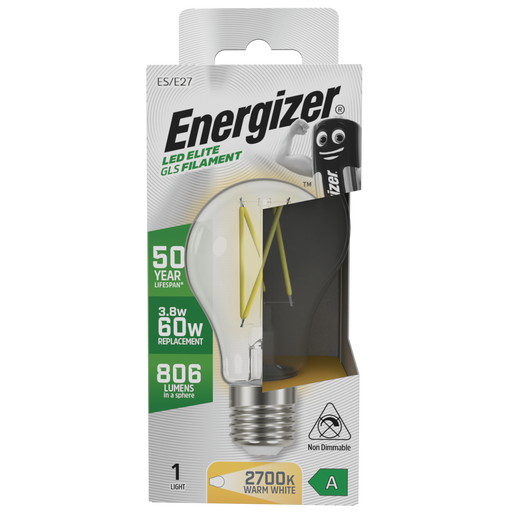
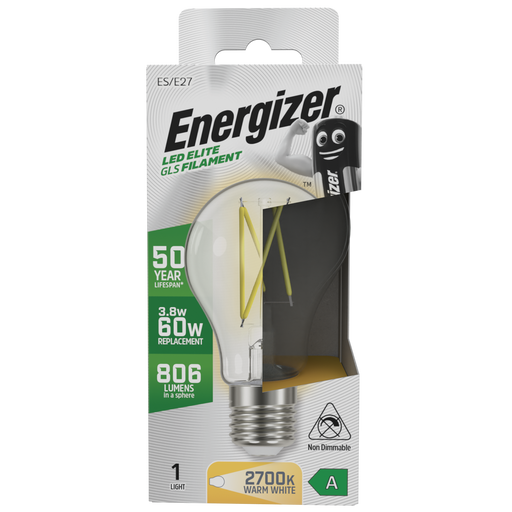
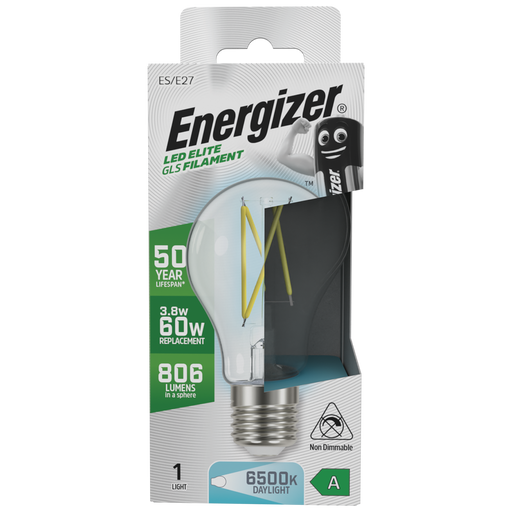

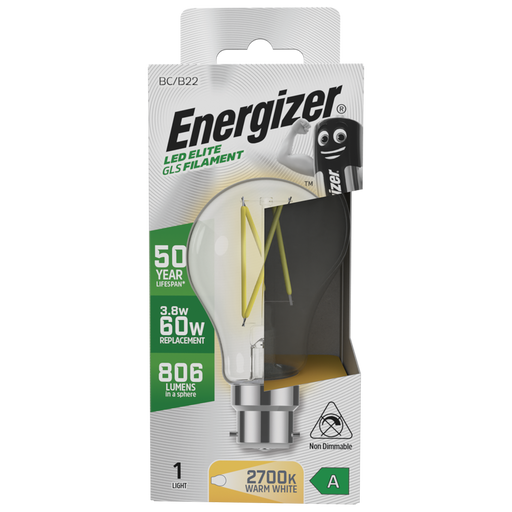

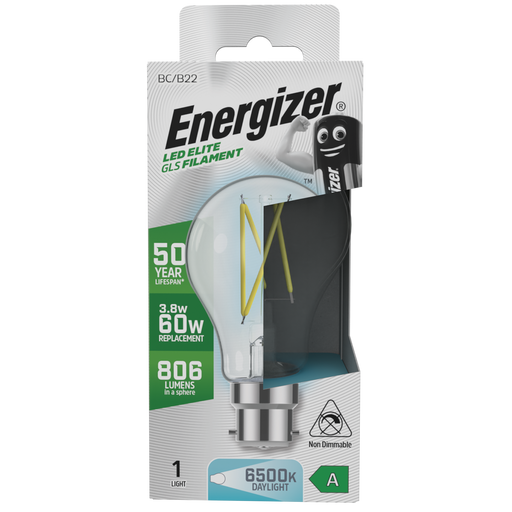

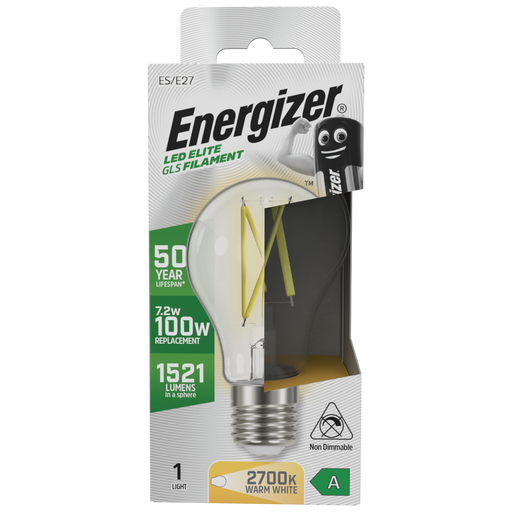

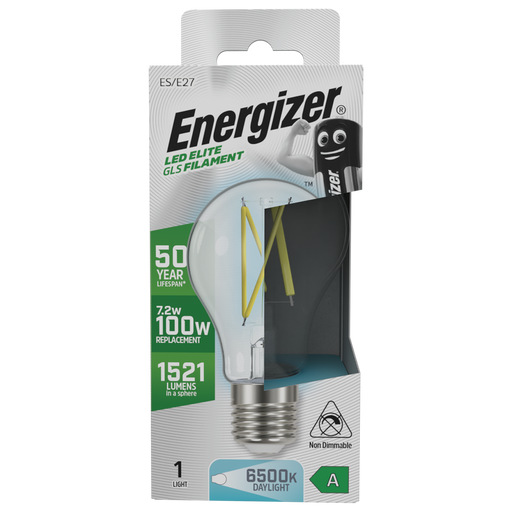

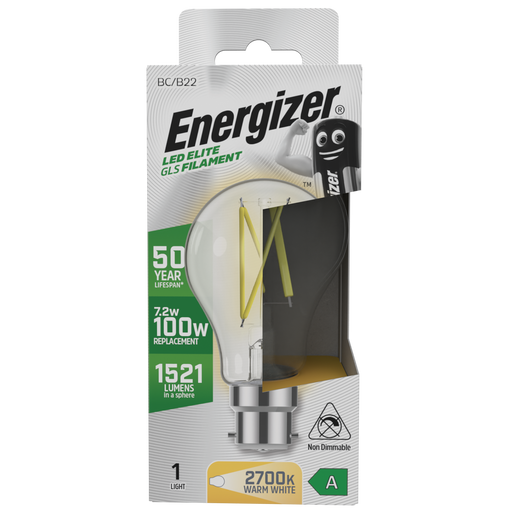
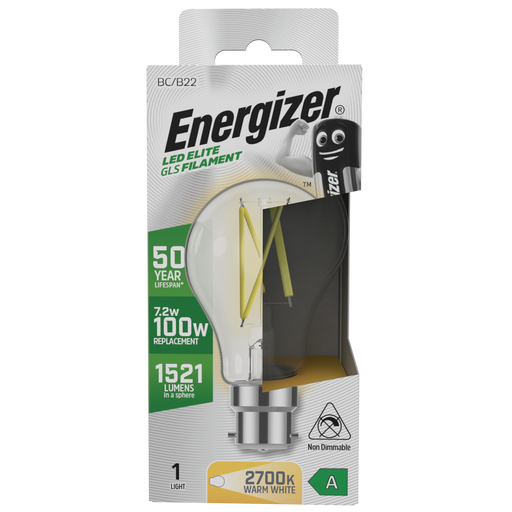
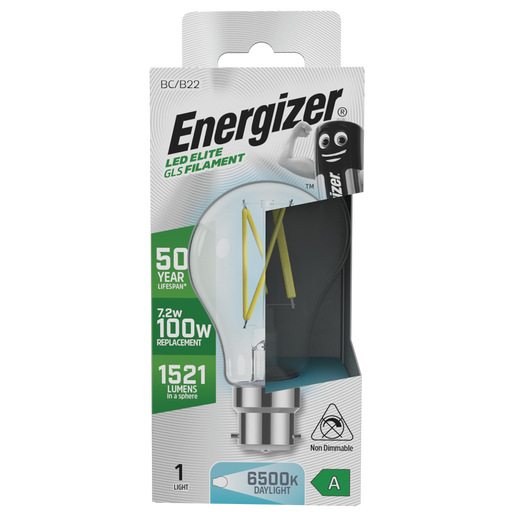
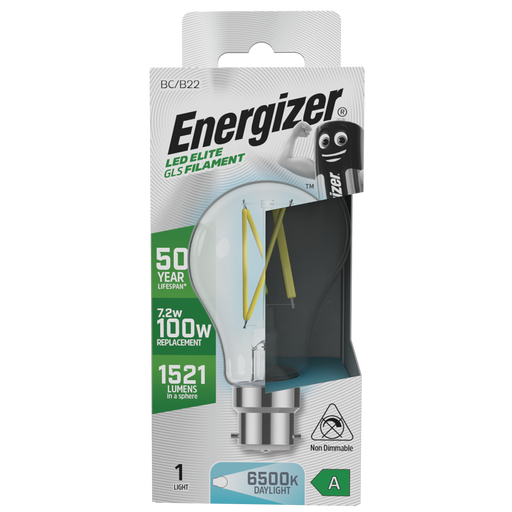
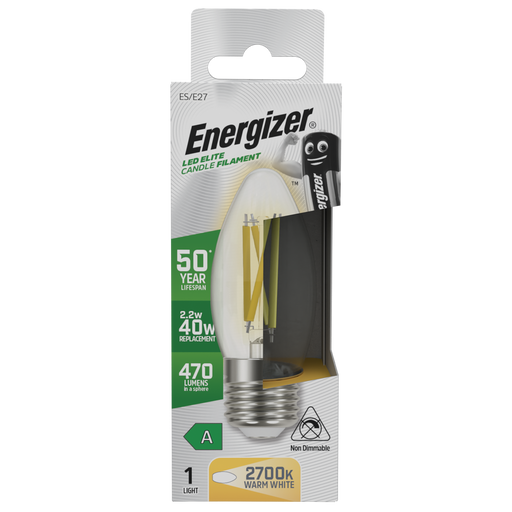
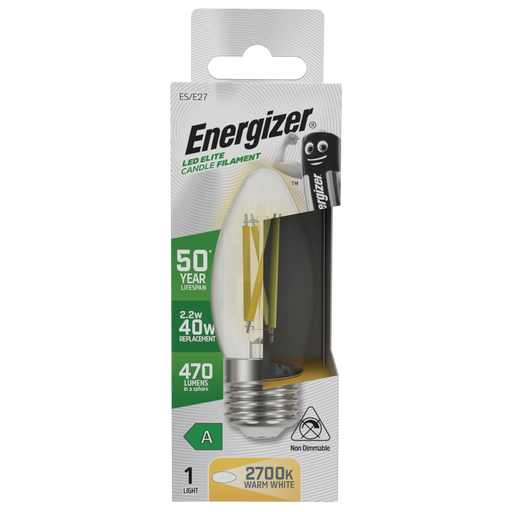
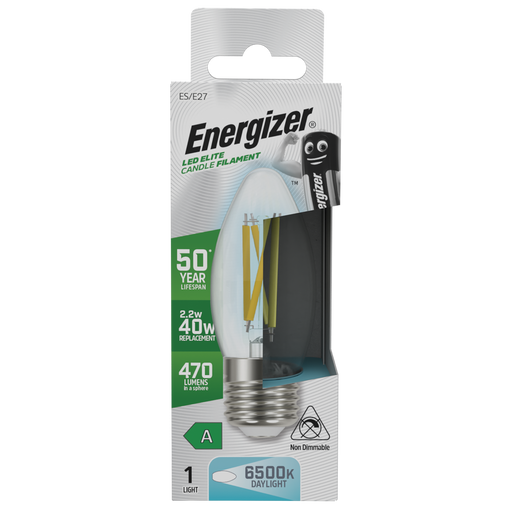
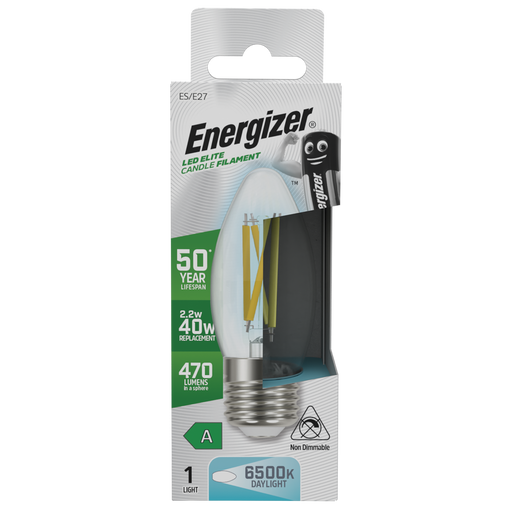
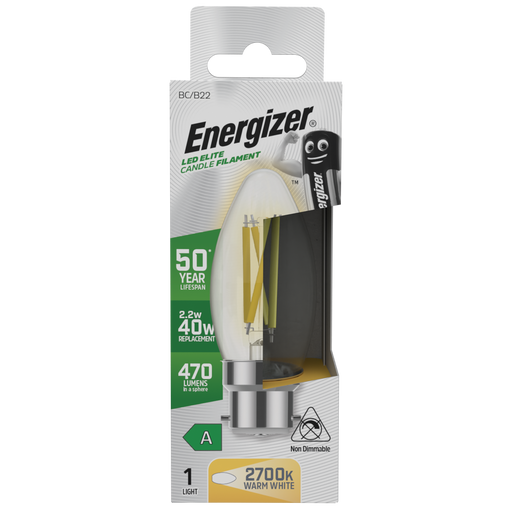
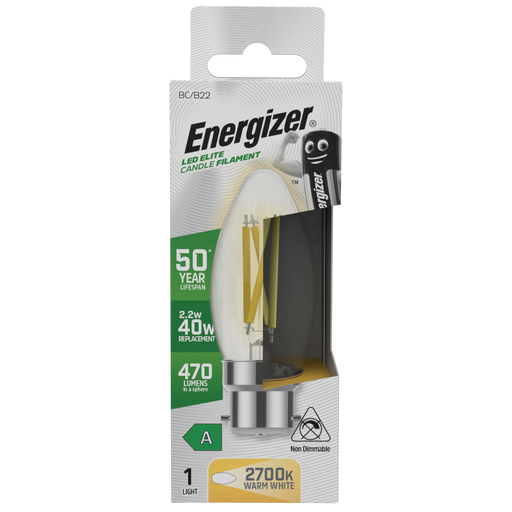
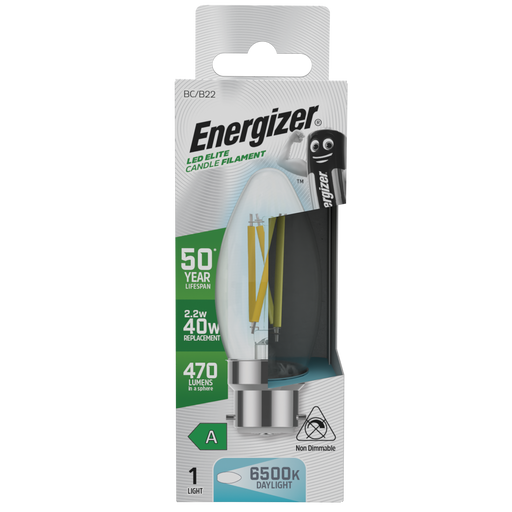
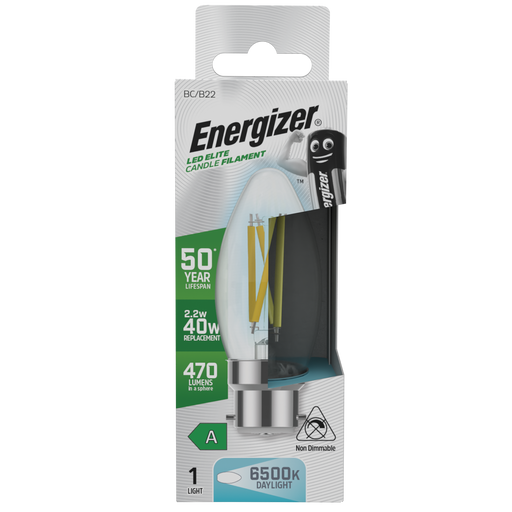
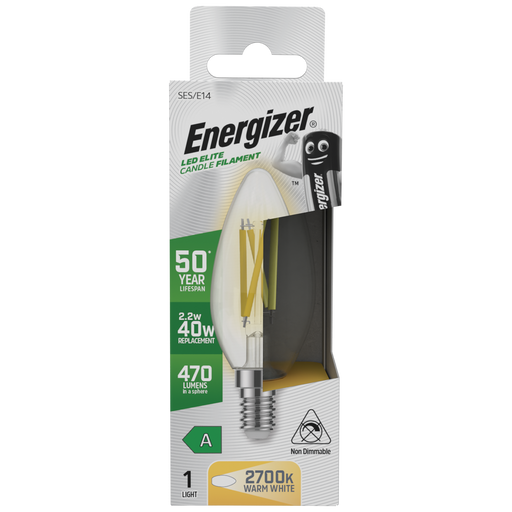
Leave a comment